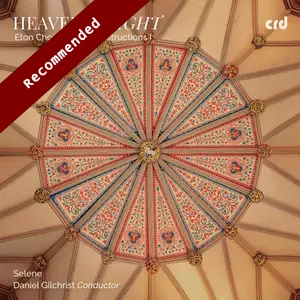
Heavenly Light • Eton Choirbook Reconstructions I
Selene/Daniel Gilchrist
rec. 2024, St. Martin’s East Woodhay, UK
CRD 3555 [65]
This is for me the most exciting new release so far this year. The Eton Choirbook, one of the greatest English manuscripts, contains music from the late fifteenth century and well into the sixteenth. The composers, had the iconoclasts destroyed it a few years later, would now have been utterly forgotten. That certainly applies to two names on this disc.
Many of the pieces survive intact. Others, missing sections or entire parts, have been ignored in the past. Russell Blacker has reconstructed nine works (some more than others) as something to do during Covid isolation; he is promising a second volume. The star of the porgramme is one Robert Wylkynson, employed at Eton College in the late fifteenth century. As the young conductor Daniel Gilchrist suggests, if one can only hear one track of this disc then it should be Wylkynson’s Magnificat in six parts.
If you have other discs of this repertoire, you will have come across Wylkynson. For instance, The Sixteen recorded his Jesus autem transience / Credo Canon a 13 and a Salve Regina on their Pillars of Eternity (Collins Classics), and the Huelgas Ensemble recorded a Salve Regina a 9 (Deutsche Harmonia Mundi) – excellent performances. Here, in addition to the Magnificat we get three other reconstructed works. That doubles his known music.
Magnificat, a virtuoso composition, is built around two plainchant cantus firmus. Gaude Virgo Mater Christi is scored for male voices, sung here one to a part. O Virgo Pridentissima unusually sets a text by Angelo Poliziano (also set by Josquin). It may have been composed for Henry VII when two Italian envoys visited Woodstock in 1497. Salve Decus Castitatis in five parts has had a great deal of reconstruction done, that is, the mean and bass parts and the countertenor from halfway. That was worth it: the work also stands out in this collection.
The programme begins with Nicholas Huchyn’s serenely elegant Ascendit Christus. He spent his formative years at Eton before moving on to Arundel. This motet is for the feast of the Assumption of our Lady.
Another forgotten figure is Robert Holyngbourne, a Doctor of Theology at Oxford. His Gaude Virgo Salutata, curiously wordy, describes the life of the Virgin from the Annunciation to Christ’s Resurrection. Daniel Gilchrist’s interesting booklet essay remarks that the listener ‘might not catch the words’ as they tumble over each other. Surely, then, a slower tempo might have been a good idea. But I am on dangerous territory here, I suspect. Scholars and quite often performers have very fixed ideas about the ‘tactus’ in this music, and will often not be shifted. So, let us move on.
Wiliam Horwood’s music has been recorded before: Gaude flore virginali by the Choir of Christ Church Oxford (Avie), and Magnificat by the Huelgas Ensemble (the same DHM disc). Hugh Benham in his book Latin Church music in England 1460-1575 (Barrie and Jenkins, 1977) describes Horwood as one of the earliest of the old-fashioned composers represented in the manuscript. Russell Blacker admits that about one fifth of Horwood’s Gaude Virgo Mater Christi (to the same text as Wylkynson) has been reconstructed but calls the motet ‘exhilarating’. That it is, due to its high tessitura and energetic rhythms. For me, it is quite a highlight. Only one other Horwood’s work, a Salve Regina, remains to be recorded. I look forward to its appearance one day.
Richard Davy was an Oxford man. Most of his music is available on disc. Benham describes him as ‘having less depth’ than other composers such as John Browne. Instead, he has ‘a certain facility’. One thing this might mean is that he is said to have composed his antiphon O Domine coeli terraeque, a huge work, in one day. His setting here, Gaude Flore Virgiali based on two plainchants, demonstrates all that is significant about his music.
As far as I am aware, all of Robert Fayrfax’s music has been recorded. Even so, it is good to have his Ave Lumen Gratiae for four male voices available. Curiously, this is only the first part; the second is to appear on Volume II of this series. The suavity of the counterpoint points to a highly professional composer that we know Fayrfax to have been.
I cannot praise the choir and its director Daniel Gilchrist enough. The project came out of the Covid pandemic, which gave Russell Blacker enough space and time to ‘conjugate’, one might say, these amazing resurrections out the ashes – the iconoclasts almost destroyed this entire incredible heritage. I greatly look forward to Volume II.
Gary Higginson
Buying this recording via a link below generates revenue for MWI, which helps the site remain free



Contents
Nicholas Huchyn (c.1465-1504?)
Ascendit Christus a5 (secunda pars)
Robert Wylkynson (c.1450-1515)
O Virgo Prudentissima a 6 (prima pars)
Robert Fayrfax (1464-1521)
Ave, Lumen Gratiae a 4 (prima pars)
Robert Wylkynson
Magnificat a 6
Robert Wylkynson
Gaude Virgo Mater Christi a 4
Richard Davy (1465-1507)
Gaude, Flore Virginali a 6 (secunda pars)
William Horwood (c.1430-1484)
Gaude Virgo Mater Christi
Robert Wylkynson
Salve Decus Castitatis
Robert Holynbourne (d.1508)
Gaude Virgo Salutate

















